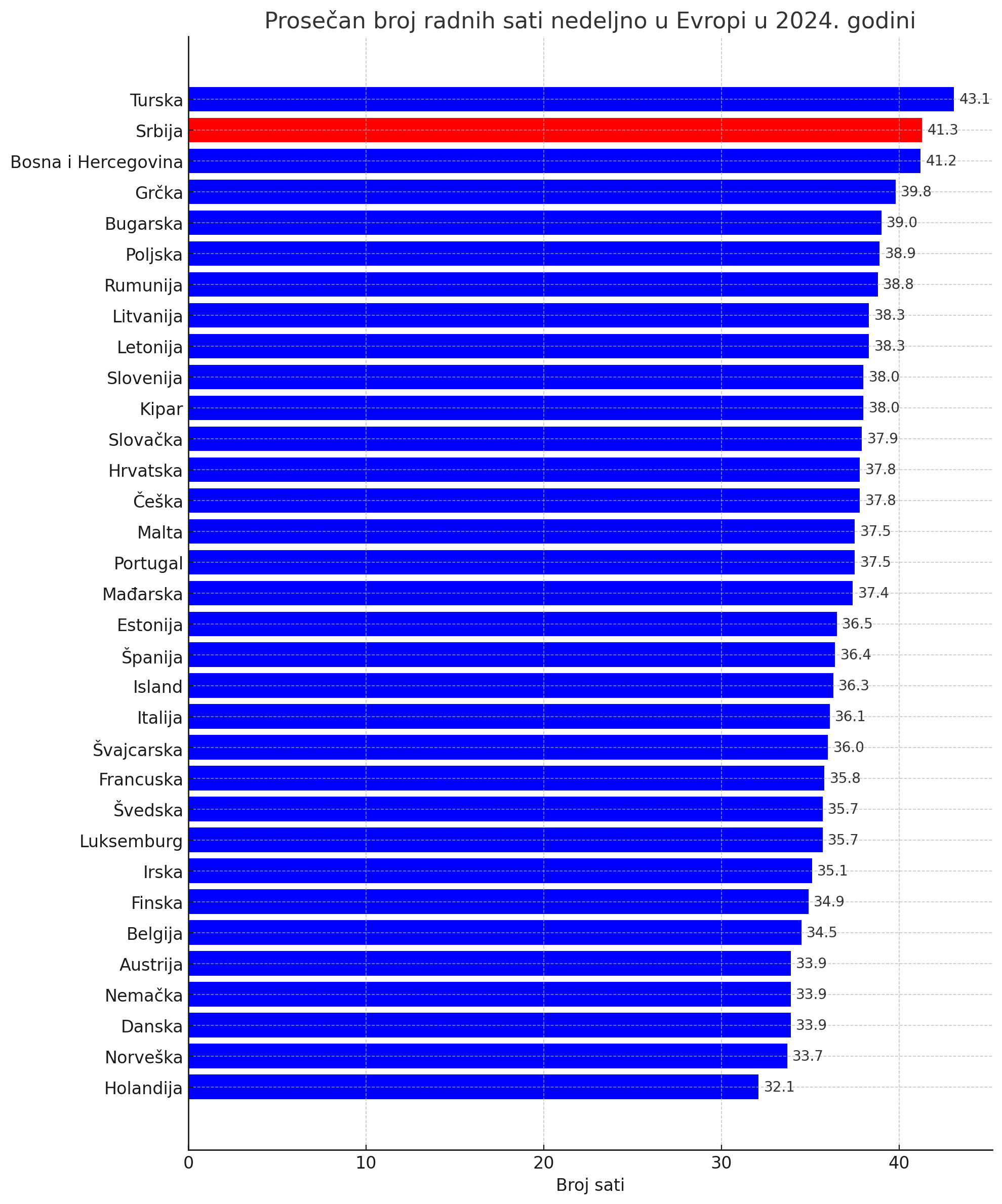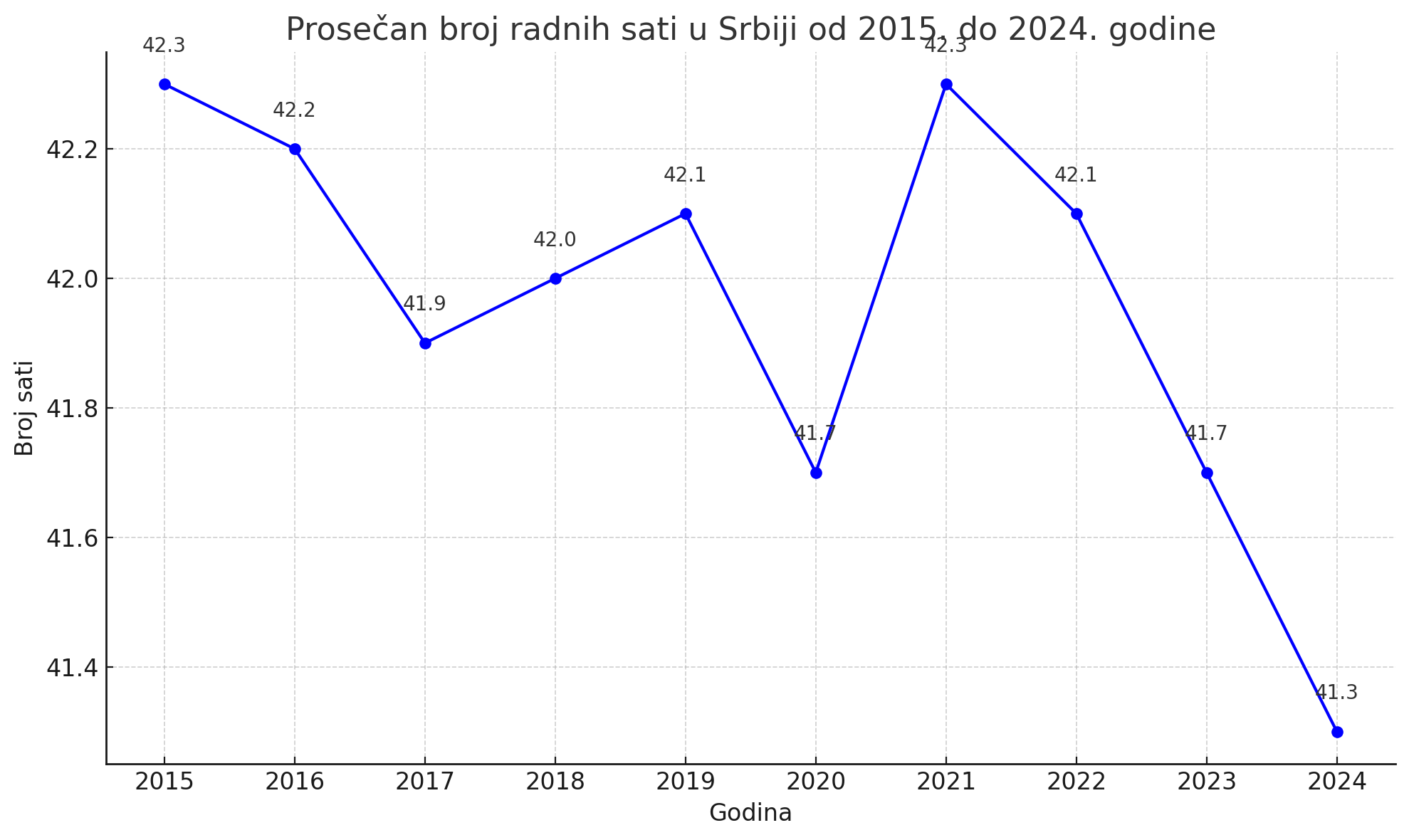We work more than almost all of Europe: Serbia second in number of working hours, why? – Economy

Workers in Serbia were in 2024. year on average 41.3 hours a week, which is significantly more than the average of the European Union (EU), where the working week stopped at 36 hours.
By the length of time spent at work, As Eurostat data showSerbia has entered another place in Europe, just behind Turkey, leaving behind the countries of the region and most of the continent.
Compared to neighbors, working week in Serbia was longer than in Hungary (37.8 hours), Romania (38.8), Bulgaria (39), Croatia (37.8), Slovenia (38) and even Bosnia and Herzegovina, which approached 41.2 hours. Eurostat did not have data for Montenegro and North Macedonia.
It is interesting that the least worked in the richest countries: in the Netherlands (32.1 hours), Norway (33.7), Denmark, Germany, Austria (all at 33.9), Belgium (34.5).
Why do Serbs have to work longer?
The professor of the Faculty of Economics in Belgrade, Aleksandra Anić explains for today that the reason for longer work in Serbia lies, above all, in low productivity, and in low labor protection protection.
« In Serbia, it is low productivity in relation to developed countries. In fact, in order to reach the same product as, say, Norway, we need to work more, » says Anic.
In addition, as it emphasizes, a big problem is a weak position of the union, as well as disrespecting work rights.
« In the countries of Western Europe, if you stay longer at work, it must be fat to you. Here people often work overtime, and when it is paid, it is a symbolic amount per hour », according to Professor.
Asked whether longer working with low salaries and the need to earn an additional earnings, Anić confirms that this connection exists, but warns that the salary cannot be seen isolated from the wider economic image.
« Increasing the minimum and average earnings would more reduce the need for additional job. But if inflation increases, forever you pay you if you can buy the same amount of goods and services as before, » Anić explains.
The reason lies in agriculture
Professor of the Faculty of Economics in Belgrade Mikhail Arandarenko explains that the reasons for several average working hours in Serbia lie in other factors – from the structure of employment, through legal differences, to socio-economic conditions.
« The part of the answer is in the structure of employees. The average working hours are obtained by the working hours of all employees. When in the country, you have a lot of employees in agriculture and much self-employed, it significantly raises the average working hours, » Arandarenko says, « says Arandarenko.
If Eurostat data are viewed in which sector workers in Serbia do the most, it is definitely agriculture.
Workers in agriculture were conducted last year 46 hours of weeks, employees in providing accommodation and food services were conducted 43.9, in construction 42.9, in the store 42, and so many hours were spent miners.
Arandarenko explains that employees in agriculture, as well as self-employed, often work longer, not only due to the nature of the work, but also because they also take on administrative obligations after a regular working day.
« Such people often say they work six days a week, to finish the cash register after work, dealing with paperwork, » a professor added.
This structure of employment is also present in Serbia, and in Turkey, as well as in other Western Balkans countries. While the Netherlands, although the Agricultural Velesilla, has only about two percent of employees in this sector, in Serbia, this percentage reaches 13 percent, Indicates Arandarenko.
As another reason why in agriculture is longer, the professor states that our agriculture is not modernized as in developed countries, so it requires more time to work.
Another reason why data on working hours in Serbia are higher than in the EU lies in the way of calculating working hours.
« With us, our eight-hour work hours including rest time. In many Western Europe countries, this holiday is not counted. The work on these countries are most often net, » Arandarenko points out.
This means that if in the contract, it says 38 hours, it means 38 hours of work, without a break, which is further guaranteed.
The next reason is that in the most developed countries, the professor is dominated by a model that enables greater flexibility – especially for women who shows practice, often choose shorter working hours in order to balance between work and family obligations.
« For example, women can choose three days full time, four hours a day, but a very small number works, especially, especially because women perform more unpaid home work, » says Arandarenko, « says Arandarenko.
According to him, in countries like the Netherlands, men are working on average about 42 hours a week, while women work 34 to 35 hours. In Serbia, this difference almost does not exist, because women and men work alike.
The poorest most work
As a broader form, Arandarenko indicates that it is mostly working in the poorest countries of the world, slightly less in medium developed, and the least in the richest.
« A hundred years ago, Keynz predicted that it would be done for only 15 hours in developed countries. He was too great, but objectively, the countries with high productivity and strong economies today work at least, » the professor concludes today.
In such countries, as stated, expensive human work is often replaced by machines and automation.
« While, for example, in India still pays off to have a robot-cleaner at the airport, it is a common occurrence in the West, » addarenko added.
Workers in Serbia in 2024. worked at least in the last 10 years
The positive data is that Serbs actually worked last year in the last 10 years.

They worked the most 2015. and 2021. years, when the average work was in weekly amounted to 42.3 hours.
Follow us on our Facebook and Instagram page, but also on X account. Subscribe to PDF List release today.






